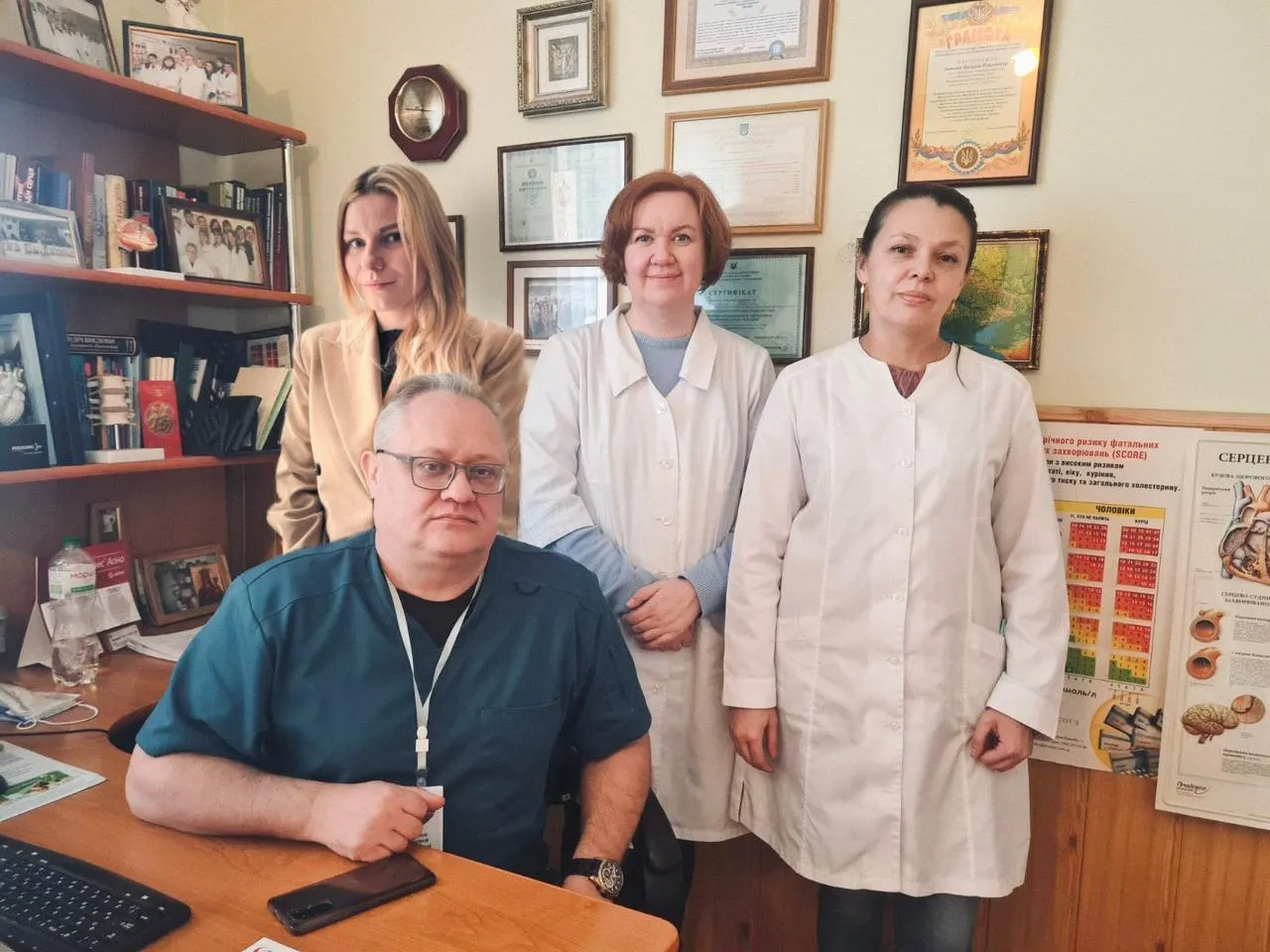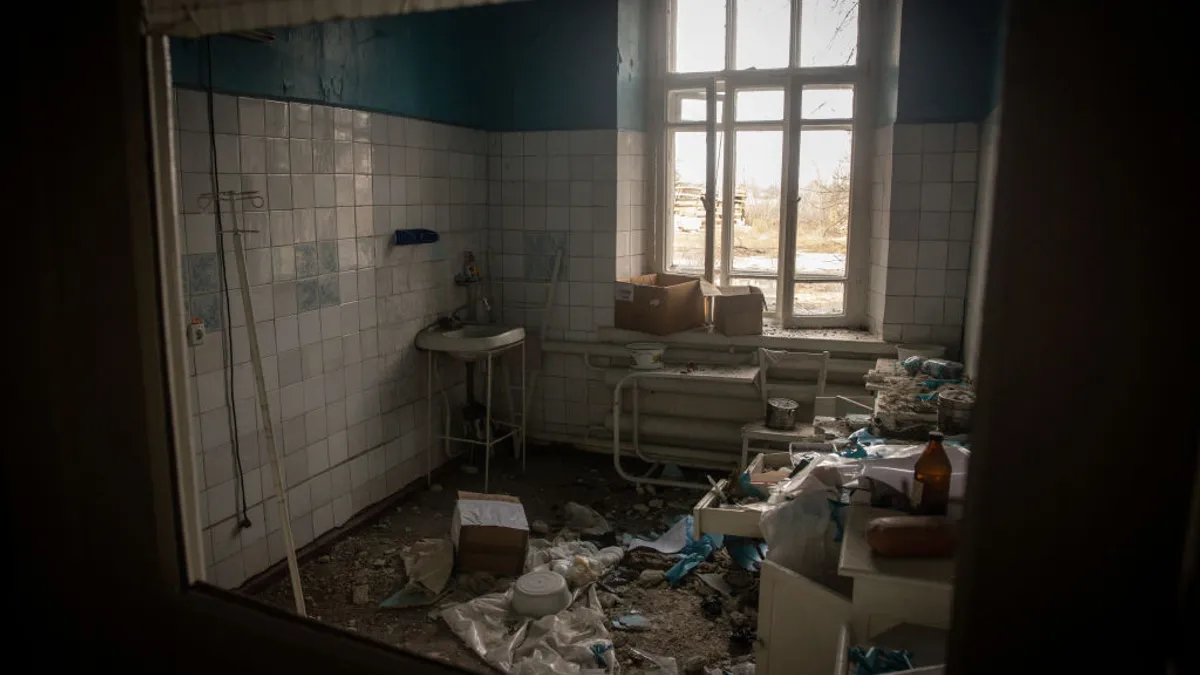As Russian troops advanced toward a suburb not far from Bucha, where a Russian military massacre left hundreds of civilians dead, the damage from missiles and drones piled up near Dr. Aleksei Zhmuro’s home.
The fighting would only inch closer until one day, a piece of a missile tore through his house like “a knife cutting through butter.”
No one was home, but the near miss prompted Zhmuro – like many Ukrainians in the line of fire — to flee the country. Soon after, the director of clinical operations, global monitoring and Ukraine country director at Parexel relocated his family to Germany. But before long, he began traveling to Ukraine to resume work. Despite the onslaught of fighting, Zhmuro said work at Parexel’s Kyiv office never stopped.
Over two years in, the conflict in Ukraine shows few signs of abating. Tens of thousands of Russian troops still occupy large swaths of territory in eastern and southern Ukraine, fighting continues in skirmishes and many analysts predict a new wave of offensive moves from both sides.
In addition to the death toll — more than 10,000 civilians have been killed according to the United Nations — the war has ravaged Ukraine’s infrastructure, power supply and key sectors of its economy, including drug research.
Before the war, Ukraine was becoming pharma’s “darling” of clinical trials, said Dr. Andreas Muehler, chief medical officer of Immunic Therapeutics, a U.S. and German biotech currently running four multiple sclerosis trials in the country.
Clinical studies surged from a yearly average of about 500 active trials to nearly 800 in 2021, according to Dr. Ivan Vyshnyvetskyy, head of the Ukrainian Association for Clinical Research. Merck & Co. and Roche were sponsoring about 100 trials in the country and UACR estimates the drug research industry was pumping about $650 million dollars into its economy.
But after the invasion, clinical work sputtered or ground to a halt. One California biotech said Ukrainian investigators were initially able to keep its study on track, but when shipping depots closed, drug supplies got pinched.
“Ultimately, we were no longer able to get drug to trial sites and [closed] new enrollment at sites across Ukraine and Russia,” the company, which preferred to remain anonymous, told PharmaVoice.
Trial starts plummeted to fewer than 30 in 2022, UACR estimated, and by the beginning of 2023, sponsors from 40 ongoing multinational trials in Ukraine reported disruptions related to the war.
The disruptions not only heaped another layer of misery onto patients who rely on drug studies to access cutting-edge medications, they created a sudden roadblock in pharma’s global trials network, sending companies scrambling for new sites around the globe.
“For some patients, [staying in a trial] is life or death."

Dr. Aleksei Zhmuro
Director of clinical operations, global monitoring, Ukraine country director, Parexel
Now, even as missiles continue to fly, Ukraine wants to reclaim its position as a go-to hub of biotech and pharma research. Regulators have sped research approvals, new trial starts are increasing, and despite lingering logistical challenges, companies like Immunic are finding ways to make it work.
“With the tightness of resources in Ukraine, these clinical trials are very important for hospitals and patients,” Muehler said. “And we are very happy with how they’ve performed.”
As Ukraine beckons the industry to return, what will it take to bring more biopharma companies back?
How Ukraine became a hotbed of clinical trials
Middle-income countries around the world have become attractive due to the lower cost of clinical work. And a country as well-educated and adept at digital medical solutions as Ukraine provides an ideal mix for trial sponsors scanning the globe for study destinations.
“Studies conducted in Ukraine cover a wide range of medical fields,” said Deb Tatton, president of global clinical and data operations at Parexel, a multinational contract research organization that’s currently running about 15 studies in Ukraine. “We have a variety of studies in hematology, ophthalmology, rheumatology, GI, psychiatry … the full gamut. However, oncology has been the largest category.”
Between 2014 and 2017, Ukraine sponsored 46% of the randomized clinical trials for cancer held in lower middle-income countries, according to an analysis published in JAMA.
In particular, Ukraine has built a reputation for achieving high patient enrollment and retention while providing reliable data.
Last June, at a Ukrainian clinical trials industry event organized by UACR and the country’s health regulators, an infectious disease researcher named Dr. Jens Lundgren took the stage to describe his experience in the country. While recruiting patients for a far-reaching multinational academic consortium called STRIVE, Lundgren said patient enrollment in Ukraine was outpacing Georgia — which Tatton called a “world champion” in patient enrollment — by a factor of six.
Ukraine is a “dominant enrolling country in this academic collaboration,” Lundgren said of the studies that span over 30 countries on six continents.
While Ukraine provides free healthcare to its citizens, the coverage often doesn’t include the most advanced therapies, which helps drive patients into clinical studies.

“For patients there, clinical trials are the best option for access to innovative medicines,” Zhmuro said.
Maintaining that access is part of why the country has boasted high retention rates, even as the war rages on.
“For some patients, it is life or death,” Zhmuro said. “For others, it’s about quality of life. But it’s always better to continue being in the study.”
With so much on the line, reestablishing the country as a global clinical trials leader has become a prime focus for the industry.
“Ukrainians are very proud people and they want to show the world they can conduct [trials] in a time of war,” Muehler said. “[Clinical staff] have said over and over again … [they] continue to operate normally, react to questions, allow monitoring at sites … they want to show us there’s not a difference now than before.”
Adapting research in a time of war
Although the country went through what Zhmuro described as a “period of shock” during the first few months of the war, Ukrainians not living in combat zones quickly adapted to a new normal. Those in the clinical trials industry also made adjustments to keep studies on track.
The first concern, Tatton said, was ensuring patients and trial staff were safe. Using Everbridge, an emergency management platform, Parexel received safety updates and trial status reports around the clock. Staying connected to CRO leaders at industry events and an in-house task force also helped the company keep tabs on developments in Ukraine. Most of all, Tatton and Muehler said they’ve relied on sources on the ground for the best real-time safety updates.
In the handful of instances when trial patients were forced from their homes and clinical studies, Tatton said Parexel has worked to keep them in the study by finding new sites to transition them to.
“It’s my personal opinion that once a patient is on an investigational drug, the CRO and/or trial sponsor is responsible for them,” Tatton said.
The company also helped dozens of clinical trial employees in Ukraine relocate to nearby countries and has provided various types of support, including mental health resources, to those who’ve remained, Tatton said.
And as the CRO developed workarounds to the emerging logistical challenges, many lessons learned during the COVID-19 pandemic came into play. In particular, COVID-era adjustments in the industry paved the way for remote clinical work.
“Regulators have implemented a system where everything can be submitted electronically because they want companies to do trials there."

Dr. Andreas Muehler
Chief medical officer, Immunic Therapeutics
“COVID helped with remote monitoring, and although many countries don’t allow direct access to [electronic medical record] data, they will allow some form of remote monitoring to ensure patient safety and protocol adherence,” Tatton said.
Even as Ukraine’s clinical trials industry has adapted to the changes brought by the conflict, one logistical issue — transporting biosamples — remains a hurdle. With civil aviation grounded, samples are moved by land to airports in nearby countries, Zhmuro said, which can lengthen travel time. On top of that, customs control and the fact that Ukrainian men between 18 and 60 are not allowed to leave the country makes finding drivers for border crossings “tricky,” Muehler noted. In response, Muehler said Immunic tries to do as much work with samples inside Ukraine as it can.
Aside from that issue, UACR’s Vyshnyvetskyy maintained that “the rest of the logistical challenges have been resolved. Everything works.”
When asked if Ukraine has enough clinical trial professionals left in the country to meet demand if pharma returns, Vyshnyvetskyy said the ratio is currently “balanced” — but admitted that if the number of trials increased suddenly, staffing could be a “challenge.”
“But in my personal communications with many clinical professionals … they are sitting in nearby countries waiting,” he said. “As soon as we have more studies [many of them] will come back home.”
What will lure pharma back?
For many pharma companies, Ukraine is still off the map. Tatton said Parexel is still seeing some “hesitance” to start new studies in Ukraine due to the ongoing uncertainty related to the war. Instead, companies have been looking to leverage nearby countries like Poland, Bulgaria, Bosnia, Turkey and Georgia to fill the gap.
Companies that do choose Ukraine are finding a welcoming environment. But there are a few caveats for companies determining if Ukraine is a good fit for their trial. The No. 1 factor, Muehler said, is a sponsor’s relationships with local staff.
“A company might usually do site visits themselves, but all of this is off,” Muehler said. “So, this has to be done by local staff you trust. You need a good partner there.”
In a country where “the hospital could get bombed or may lose electricity,” Muehler said flexibility with SOPs is also crucial.
For example, in other trials, Immunic never had to secure source documents at sites. But by providing the necessary tools to investigators in Ukraine, the company was able to secure documents safely in the cloud so they wouldn’t be vulnerable to potential destruction from the war.
“You have to pay attention to [all of these details in Ukraine], and sometimes bigger companies are not willing to do this,” he said.
In response to the drop in trial starts, Ukrainian regulators have sped study approvals to a 35-day timeframe to get them off the ground quickly, Vyshnyvetskyy said.
“We need to clearly demonstrate that during these two years of war, Ukrainian investigators and clinical professionals showed not only resilience but robust results."

Dr. Ivan Vyshnyvetskyy
President, Ukrainian Association for Clinical Research
“Our minister of health changed its attitude,” Vyshnyvetskyy explained. “Before the war, it was purely a regulator. Now, it is also a supportive partner of the industry.”
Muehler echoed the sentiment, explaining that Ukraine is a “very quick country.”
“Regulators have implemented a system where everything can be submitted electronically because they want companies to do trials there,” he said.
Although Parexel recently signed a contract with a large pharma to start a new trial in Ukraine, Tatton predicted 2024 will remain a “year of reflection” on how studies are going, and that trial starts could pick up more quickly next year. Part of that growth will not only hinge on the state of the conflict, but on a pharma company publicizing how it brought “new sites on board and got good data” from Ukraine, and then showcasing those results to the rest of the industry.
In the long run, Tatton is optimistic Ukraine’s clinical trials industry will rebound and noted the international landscape of studies is always evolving.
“Whether it’s inflation or geopolitical reasons, there is a constant shift happening,” she said.
To help lure companies back, Vyshnyvetskyy has been getting the word out that “not only are clinical trials needed in Ukraine, but Ukraine is needed for the industry.” Vyshnyvetskyy, who pointed out that he’s still a practicing internal medicine doctor, not a marketer, said he isn’t sure how receptive pharma is to his attempts at advocacy. Most recently, Vyshnyvetskyy said UACR pinpointed about 50 pharma companies looking to start studies around the world and reached out with an email “providing information about the current state of Ukraine, all the benefits of running studies here and why we need the support.”
So far, none of the companies have followed up.
“We need to clearly demonstrate that during these two years of war, Ukrainian investigators and clinical professionals showed not only resilience but robust results. This is a huge and important message,” he said.




















